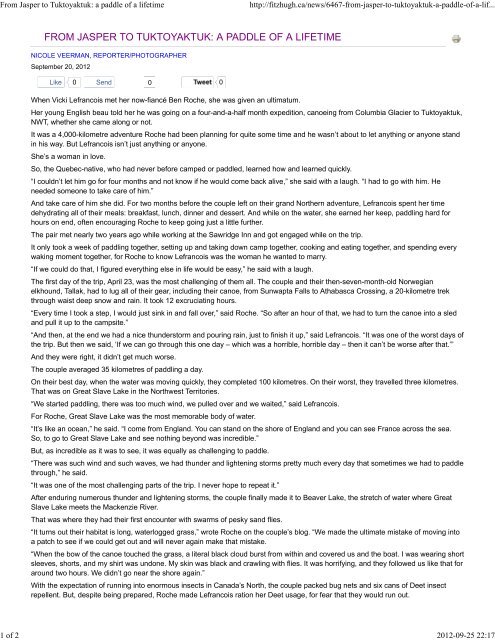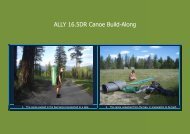From Jasper to Tuktoyaktuk: a paddle of a lifetime - Paddle The Waters
From Jasper to Tuktoyaktuk: a paddle of a lifetime - Paddle The Waters
From Jasper to Tuktoyaktuk: a paddle of a lifetime - Paddle The Waters
Create successful ePaper yourself
Turn your PDF publications into a flip-book with our unique Google optimized e-Paper software.
<strong>From</strong> <strong>Jasper</strong> <strong>to</strong> Tuk<strong>to</strong>yaktuk: a <strong>paddle</strong> <strong>of</strong> a <strong>lifetime</strong><br />
http://fitzhugh.ca/news/6467-from-jasper-<strong>to</strong>-tuk<strong>to</strong>yaktuk-a-<strong>paddle</strong>-<strong>of</strong>-a-lif...<br />
1 <strong>of</strong> 2 2012-09-25 22:17<br />
FROM JASPER TO TUKTOYAKTUK: A PADDLE OF A LIFETIME<br />
NICOLE VEERMAN, REPORTER/PHOTOGRAPHER<br />
September 20, 2012<br />
Like 0 Send<br />
0 Tweet 0<br />
When Vicki Lefrancois met her now-fiancé Ben Roche, she was given an ultimatum.<br />
Her young English beau <strong>to</strong>ld her he was going on a four-and-a-half month expedition, canoeing from Columbia Glacier <strong>to</strong> Tuk<strong>to</strong>yaktuk,<br />
NWT, whether she came along or not.<br />
It was a 4,000-kilometre adventure Roche had been planning for quite some time and he wasn’t about <strong>to</strong> let anything or anyone stand<br />
in his way. But Lefrancois isn’t just anything or anyone.<br />
She’s a woman in love.<br />
So, the Quebec-native, who had never before camped or <strong>paddle</strong>d, learned how and learned quickly.<br />
“I couldn’t let him go for four months and not know if he would come back alive,” she said with a laugh. “I had <strong>to</strong> go with him. He<br />
needed someone <strong>to</strong> take care <strong>of</strong> him.”<br />
And take care <strong>of</strong> him she did. For two months before the couple left on their grand Northern adventure, Lefrancois spent her time<br />
dehydrating all <strong>of</strong> their meals: breakfast, lunch, dinner and dessert. And while on the water, she earned her keep, paddling hard for<br />
hours on end, <strong>of</strong>ten encouraging Roche <strong>to</strong> keep going just a little further.<br />
<strong>The</strong> pair met nearly two years ago while working at the Sawridge Inn and got engaged while on the trip.<br />
It only <strong>to</strong>ok a week <strong>of</strong> paddling <strong>to</strong>gether, setting up and taking down camp <strong>to</strong>gether, cooking and eating <strong>to</strong>gether, and spending every<br />
waking moment <strong>to</strong>gether, for Roche <strong>to</strong> know Lefrancois was the woman he wanted <strong>to</strong> marry.<br />
“If we could do that, I figured everything else in life would be easy,” he said with a laugh.<br />
<strong>The</strong> first day <strong>of</strong> the trip, April 23, was the most challenging <strong>of</strong> them all. <strong>The</strong> couple and their then-seven-month-old Norwegian<br />
elkhound, Tallak, had <strong>to</strong> lug all <strong>of</strong> their gear, including their canoe, from Sunwapta Falls <strong>to</strong> Athabasca Crossing, a 20-kilometre trek<br />
through waist deep snow and rain. It <strong>to</strong>ok 12 excruciating hours.<br />
“Every time I <strong>to</strong>ok a step, I would just sink in and fall over,” said Roche. “So after an hour <strong>of</strong> that, we had <strong>to</strong> turn the canoe in<strong>to</strong> a sled<br />
and pull it up <strong>to</strong> the campsite.”<br />
“And then, at the end we had a nice thunders<strong>to</strong>rm and pouring rain, just <strong>to</strong> finish it up,” said Lefrancois. “It was one <strong>of</strong> the worst days <strong>of</strong><br />
the trip. But then we said, ‘If we can go through this one day – which was a horrible, horrible day – then it can’t be worse after that.’”<br />
And they were right, it didn’t get much worse.<br />
<strong>The</strong> couple averaged 35 kilometres <strong>of</strong> paddling a day.<br />
On their best day, when the water was moving quickly, they completed 100 kilometres. On their worst, they travelled three kilometres.<br />
That was on Great Slave Lake in the Northwest Terri<strong>to</strong>ries.<br />
“We started paddling, there was <strong>to</strong>o much wind, we pulled over and we waited,” said Lefrancois.<br />
For Roche, Great Slave Lake was the most memorable body <strong>of</strong> water.<br />
“It’s like an ocean,” he said. “I come from England. You can stand on the shore <strong>of</strong> England and you can see France across the sea.<br />
So, <strong>to</strong> go <strong>to</strong> Great Slave Lake and see nothing beyond was incredible.”<br />
But, as incredible as it was <strong>to</strong> see, it was equally as challenging <strong>to</strong> <strong>paddle</strong>.<br />
“<strong>The</strong>re was such wind and such waves, we had thunder and lightening s<strong>to</strong>rms pretty much every day that sometimes we had <strong>to</strong> <strong>paddle</strong><br />
through,” he said.<br />
“It was one <strong>of</strong> the most challenging parts <strong>of</strong> the trip. I never hope <strong>to</strong> repeat it.”<br />
After enduring numerous thunder and lightening s<strong>to</strong>rms, the couple finally made it <strong>to</strong> Beaver Lake, the stretch <strong>of</strong> water where Great<br />
Slave Lake meets the Mackenzie River.<br />
That was where they had their first encounter with swarms <strong>of</strong> pesky sand flies.<br />
“It turns out their habitat is long, waterlogged grass,” wrote Roche on the couple’s blog. “We made the ultimate mistake <strong>of</strong> moving in<strong>to</strong><br />
a patch <strong>to</strong> see if we could get out and will never again make that mistake.<br />
“When the bow <strong>of</strong> the canoe <strong>to</strong>uched the grass, a literal black cloud burst from within and covered us and the boat. I was wearing short<br />
sleeves, shorts, and my shirt was undone. My skin was black and crawling with flies. It was horrifying, and they followed us like that for<br />
around two hours. We didn’t go near the shore again.”<br />
With the expectation <strong>of</strong> running in<strong>to</strong> enormous insects in Canada’s North, the couple packed bug nets and six cans <strong>of</strong> Deet insect<br />
repellent. But, despite being prepared, Roche made Lefrancois ration her Deet usage, for fear that they would run out.
<strong>From</strong> <strong>Jasper</strong> <strong>to</strong> Tuk<strong>to</strong>yaktuk: a <strong>paddle</strong> <strong>of</strong> a <strong>lifetime</strong><br />
http://fitzhugh.ca/news/6467-from-jasper-<strong>to</strong>-tuk<strong>to</strong>yaktuk-a-<strong>paddle</strong>-<strong>of</strong>-a-lif...<br />
2 <strong>of</strong> 2 2012-09-25 22:17<br />
“We came back with four and a half cans because I rationed it,” said Roche with a hearty laugh.<br />
<strong>From</strong> Beaver Lake, the couple continued North up the Mackenzie River, s<strong>to</strong>pping in a number <strong>of</strong> small communities, including Fort<br />
Providence, Fort Simpson, Norman Wells, Fort Good Hope, Inuvik and finally Tuk<strong>to</strong>yaktuk.<br />
In each community, they were surprised by the warm welcome extended <strong>to</strong> them by the locals, who happily opened their homes and<br />
cupboards <strong>to</strong> the couple.<br />
“We got a lot <strong>of</strong> invites <strong>to</strong> dinner. On a few days, people even showed up in the morning by mo<strong>to</strong>rboat – First Nation guys – and asked,<br />
‘Do you want some fish for breakfast?’ and then pass us a giant whitefish,” said Roche.<br />
“Yeah, I didn’t expect that,” continued Lefrancois.<br />
Nor did she expect the beauty <strong>of</strong> the Northern tundra, where there are no trees hindering your view <strong>of</strong> the never ending sky.<br />
“I was really amazed by that. It’s just huge and a lot <strong>of</strong> emptiness,” she said. “<strong>The</strong> sunsets were amazing.”<br />
On the couple’s last night <strong>of</strong> camping, before arriving in Tuk<strong>to</strong>yaktuk, they saw green streaks <strong>of</strong> light dancing across the sky. It was the<br />
Aurora Borealis.<br />
<strong>The</strong>y viewed the sight as a reward for all <strong>of</strong> their hard work and as a good omen for their final day <strong>of</strong> paddling.<br />
<strong>The</strong> next morning, Aug. 30, they woke up early and <strong>paddle</strong>d in<strong>to</strong> Tuk<strong>to</strong>yaktuk just as the sun was rising.<br />
“It was magical, and all the more <strong>of</strong> a powerful paddling experience as it was our last on the trip,” said Roche.<br />
After a week in Tuk<strong>to</strong>yaktuk, the couple flew <strong>to</strong> Inuvik, where they met a friend who drove them the 3,500 kilometres back <strong>to</strong> <strong>Jasper</strong>.<br />
<strong>The</strong>y arrived home Sept. 10 and now plan <strong>to</strong> travel east <strong>to</strong> Quebec, where they will build their own house, grow their own food and<br />
become self-sufficient.<br />
But, this doesn’t mark the end <strong>of</strong> their adventure. In two years, the couple plans <strong>to</strong> return <strong>to</strong> Athabasca Crossing <strong>to</strong> depart on a canoe<br />
trip <strong>to</strong> the Pacific Ocean, and later, after they’ve built their own canoe, they hope <strong>to</strong> go back a third time <strong>to</strong> make the trip from the<br />
Athabasca River <strong>to</strong> the Atlantic Ocean.<br />
“<strong>From</strong> <strong>Jasper</strong> it’s so easily accessible right at the door,” said Roche <strong>of</strong> adventure. “We started by going North. Now we have <strong>to</strong> go East<br />
and West.”<br />
To learn more about Roche, Lefrancois, Tallak and their Northern adventure, visit www.<strong>paddle</strong>thewaters.org.



